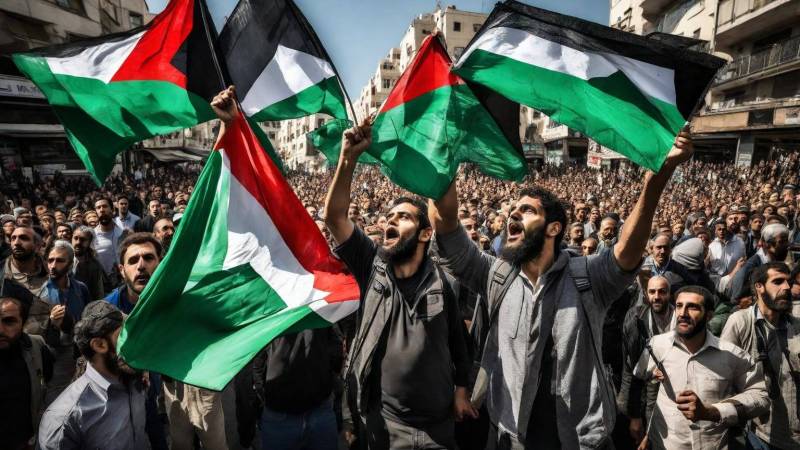
When it comes to Israel's war on Gaza, there is clearly a disconnect between large segments of the population and those who sit in the corridors of power in western democracies. In London and Washington, hundreds of thousands have come out on the streets to show solidarity with the Palestinians. In Paris and Berlin too, despite their governments' attempts to ban the rallies, people flooded the streets and town squares in support of Palestine.
Yet standing up for what is right, speaking truth to power, never comes without cost. So not only have activists risked police brutality and courted arrest in European capitals, but students at elite American universities have taken an exceptionally bold stand, at the cost of smear campaigns run against them and job offers rescinded.
For too long, any criticism of Israel was conflated with anti-Semitism in the US and thus silenced. When I think back to my time in university in the United States, it was impossible to say anything critical about Israel without being blacklisted. But that has changed now. Although doxxing trucks have displayed names and photos of students active for Palestine at Columbia and Harvard, in a crass attempt to silence and smear them, student protests continue.
The groundswell of opinion is shifting and the students are playing a very prominent and courageous role in that shift. A lot of it has to do with sheer numbers. In my time, the Islamic Cultural Society that I helped form at The College of William and Mary in southern Virginia had scarcely 15 members. College campuses nowadays have far greater numbers of Muslim students, empowering them not only to take collective action on political issues important to them but also in educating the non-Muslims students about their stance.
This is not to suggest that only Muslim students are active in the resistance for Palestine. A lot of Jewish students and indeed people from all different walks of life and backgrounds are registering their protests. An interesting case is that of Josh Paul of the State Department, who resigned on principle. For over a decade he had overseen arms transfers to foreign countries on behalf of the US government. His resignation letter noted however that he had made too many "moral compromises" in the course of his work and that he could not continue doing so, particularly since "blindly supporting one side" wasn't in the American interest.
Craig Mokhiber, director of the United Nations human rights body, also resigned, stating, "Once again we are seeing a genocide unfold before our eyes and the organisation we serve appears powerless to stop it."
Contentious and polarising as this issue is in the West, it is worth noting that despite homogeneous support for Palestine from Morocco to Malaysia, the Muslim Ummah remains powerless to put an end to Palestinian plight
When questioned by Becky Anderson on CNN whether the characterisation of the Israel-Palestine conflict in his resignation letter was overtly anti-Semitic, Mokhiber responded by stating, "Criticism of Israeli human rights violations is not anti-Semitic any more than criticism of Saudi violations is Islamophobic or criticism of Burmese violations is anti-Budhist or criticism of Indian violations is anti-Hindu."
The gulf between those in power and those advocating for a change in policy remains. However, ultimately, in a democracy, numbers matter. And slowly but surely, the numbers are growing. Even as western governments have tried to curtail the right to free speech and freedom of assembly, citizens continue to exercise these rights, as they are guaranteed in a democracy. In France, for example, the top administrative court ruled that demonstrations in support of Palestine cannot be categorically banned, despite the interior ministry's claims that they posed a threat to public order.
Contentious and polarising as this issue is in the West, it is worth noting that despite homogeneous support for Palestine from Morocco to Malaysia, the Muslim Ummah remains powerless to put an end to Palestinian plight. This should be a source of shame for Muslim-majority, and particularly, Arab, countries. Collectively, they have strong armies (Egypt, Turkey, Pakistan, Indonesia) and money (Saudi Arabia, UAE, Kuwait, Qatar). But what they don't have is democracy.
The strongmen ruling as autocrats are actually weak and looking for western security guarantees because they know they don't have enough support amongst their own people and hence can't trust them.
The West knows this and has always exploited it. This is precisely what emboldened the USA to get Morocco, Bahrain and UAE to normalise with Israel even as an extreme right-wing government in Israel continued to encroach on Palestinian land.
Saudi Arabia was next on the list--poised to normalise the brutality of Netanyahu--until Hamas, in all likelihood backed by Iran, threw a spanner in the works. But imagine the Custodian of the Two Holy Mosques (as the King is commonly known in Saudi Arabia) shaking hands with Benjamin Netanyahu without having to answer to his own people or the press as to how the shift in policy is in their interest.
Biden too is acting against American interest many will point out. But at least Biden will pay for it come election time in 2024. In the case of monarchs and dictators, there is no accountability.
The West knows that and takes advantage of it.

